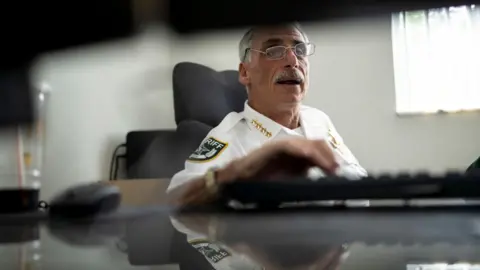 Getty Images
Getty ImagesA Florida sheriff frustrated by a series of false school shooting threats released a mugshot of an 11-year-old child as well as two other young people accused of threatening to carry out attacks.
Sheriff Mike Chitwood, of Volusia County, Florida, posted the photo of the 11-year-old boy on social media after he was arrested.
“Every time we make an arrest,” he told a news conference last week, “your kid’s photo is going to be put out there… so that everybody can see what your kid’s up to.”
His efforts to name and shame has stirred debate, with some accusing the sheriff of being a “vigilante” and others defending the move as a means to deter crime.
Sheriff Chitwood said his department arrested the 11-year-old after he threatened to carry out a school shooting with a written list of names he planned to target. The child, who BBC News is not naming due to his age, then allegedly said it was a joke.
He was charged with the felony of making a written threat of a mass shooting, Sheriff Chitwood wrote in his post, noting that police recovered a number of weapons including airsoft rifles, pistols and fake ammunition.
Florida law allows juvenile records to be released only when individuals are charged with a felony, unlike in many other states and countries where juveniles would be granted anonymity.
On Wednesday, two other young people, aged 16 and 17, were arrested and charged with a felony for allegedly threatening a school shooting in a Snapchat.
They too claimed it was a joke, the sheriff said.
He posted video of the pair exiting a police car in handcuffs and then being processed at a jail.
Since the sheriff posted the social media images and videos of the alleged suspects, there has been a debate online about his decision.
Some social media users suggested the move would deter potential offenders. “Glad you are bringing these kids into custody and showing them this is not funny, they need to be disciplined,” a Facebook user wrote under one of the sheriff’s posts.
But others expressed concern about the potential impact on the children and teenagers.
Daniel Mears, a criminology professor at Florida State University who researches school shootings, told the Associated Press that juvenile records “were supposed to be confidential for a reason”.
“The idea was that kids would have a second shot in life,” Prof Mears said, while noting that school threats are treated differently.
Sheriff Chitwood, meanwhile, said he was unsure if the public shaming would work but “something has to be done”.
“Kids need to realise that what they post and send on social media is not private,” he wrote on social media. “It will get reported to us.”

